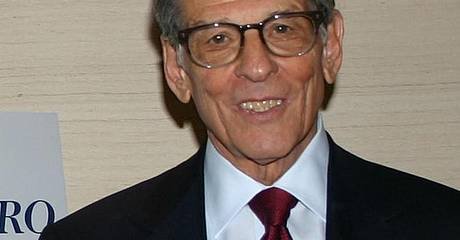
Prize-winning author Robert Caro was once a Carnegie Journalism Fellow and has never forgotten the role the Corporation played in his life. In 1966 Caro had signed the contract to write his first book, The Power Broker, about New York’s controversial master planner, Robert Moses. “It was a small contract and I couldn’t afford to quit my job as a reporter for Newsday,” he says. “For some months I was trying to stay on the job and write the book and making no real progress. Along came the Carnegie Fellowship, which paid my salary and allowed me to get started on the way to writing The Power Broker. Looking at my life, I can’t overstate the importance of that opportunity.” Published in 1974, The Power Broker won Caro the first of his two Pulitzer Prizes.
Robert Caro visited Carnegie Corporation in June 2008 to celebrate the publication of The Passage of Power, Book Four in his epic The Years of Lyndon Johnson, and kindly agreed to discuss what all his books are really about.
I’ve said from the beginning my books aren’t biographies. I’m not interesting in telling the life of a great man. My interest is in political power and how it works. The U.S. is a democracy, so we the people are supposed to have the power. Therefore, the more we know about how political power really works, the better we can do – not just theoretically, but really.

In The Power Broker, we see how urban power works, not just in New York but all cities in the U.S. in the last half of the century. Moses never ran for office but had more power than anyone who was elected. I felt if I could find out the sources of his power and explain it, then I’d make some sort of contribution.
I wanted to do the same thing for national power. LBJ was a perfect subject because he did things no one had done before. This would add to our understanding. Political power is the central theme of Master of the Senate [Book Three]--not only his life while in the Senate, but how power works in the U.S. Senate in the 20th century. Wouldn’t we all like to know more about how the senate operated in Rome?
In Passage of Power we see him taking the reins of the legislature. Only 47 days after the assassination Johnson not only picks up Kennedy’s work but makes an announcement in the State of the Union Address, of a program that would have transformed the United States: the War on Poverty.
Presidential power is character. Character plays a much larger role in history than is generally achieved. Great men do alter the course of history. To me, history comprises economy, politics, geography. One key factor, the personality of the man who has power, is not given as much weight as it should be. Here’s the thing about power: power reveals. We all know the Acton quote about how power corrupts. But I would argue, power reveals. When a man has enough power to do whatever he wants, then we can see what he really wants to do.
If you look at power, one way to see it is in a time of war. All the different facets of power are deployed to meet this crisis. In what Johnson does you see the full potentiality of the presidency.
In the case of Johnson and civil rights, we see him moving adroitly toward his goal. His first job after college was as a teacher in a small Mexican-American school where most of the students were poor and hungry. He said that he never forgot seeing what poverty did to young children and he dreamt of one day having a the power to help them. Now that he had it, he meant to use it.
I don’t draw parallels to today. People can take any lessons they want from history. One thing I’ve learned, we don’t really know what’s going on while it’s happening. Regarding Passage of Power, no one had ever analyzed those years in terms of what really happened. Media coverage is the shadow of the substance, but never the whole story. It was very hard if not impossible to know at the time. The same is true today.


